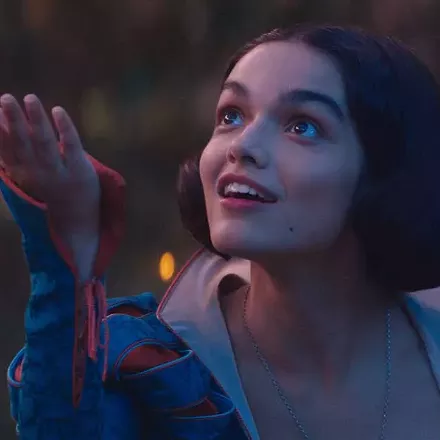Feature movie review: LEE
The life of groundbreaking war correspondent Lee Miller gets a fittingly monumental film tribute.
By MaryAnn JohansonI'd vaguely heard of World War II photographer Lee Miller before Lee, but only as hazy background noise. Why isn't she better known? She should be so ubiquitous in the legend of the war as to be downright cliché. She produced some of the first photographic images of liberated German concentration camps. She was responsible for a series of photographs taken in Hitler's actual apartment, just after his suicide, that ... well, not to spoil for anyone not already aware (I wasn't!), but they were a huge middle-finger to der Führer, and notions of Nazi superiority.
Anyway, now we have the tremendous Lee to begin righting this wrong. In no way does this movie do full justice to the enormous audacity of her life, which stretched from New York (she was American) to Paris to Cairo and beyond: work in the 1920s as a fashion model; spending the early '30s as a fashion photographer and muse/friend/collaborator with artists including Man Ray and Jean Cocteau; as a surrealistic artistic photographer herself. Instead, Lee covers mostly just the less-than-a-decade of her WWII war correspondent work. Miller was so incredible a character that this movie barely scratches the surface of her. And still, it is an important film.
Lee unfolds in retrospect, as if to emphasize that with a personality such as hers—as a woman who defied norms and pushed boundaries—it is only when looking back that we can fully understand her, from a perspective that has perhaps started to catch up with hers. "I was good at drinking, having sex and taking pictures," Miller says as the movie opens, "and I did all three as much as I could." She is speaking in 1977 to an anonymous interviewer played by the lovely Josh O'Connor, appearing at intervals throughout the film; the subtleties of his performance only become obvious in retrospect, at the brutally incisive ending. Miller doesn't much seem to care one way or the other about sharing her story, which slots right into the no-fucks-given attitude we come to see that she fully embodied with her entire life. She wasn't trying to break new ground. She was just living as full a life of purpose and passion as possible, in ways that the world wasn't quite ready to allow women to do.
Kate Winslet bears a passing physical resemblance to Miller, but much more vitally, brings the necessary ballsiness as a woman who faced sexism at every turn yet forced it to work for her—because what other choice did she have? Miller was, we learn, accredited as a war correspondent, then constantly limited in the access she was allowed. But would a male journalist ever have conceived of—or had the entrée necessary for—capturing poignant yet quietly defiant imagery of nurses drying their freshly-laundered unmentionables in the sunny windows of their sparse, harsh barracks? Of course not. Lee brings us moments like this repeatedly, reminding us that because Miller was denied the opportunities that men got, she was forced to find untold stories to tell. And she did so with huge impact.
Film is about moving pictures, of course, but Lee deploys still images such as those Miller took—some of the re-creations here are actually ones Winslet took on the set with period cameras—to powerful effect. Director Ellen Kuras, a veteran cinematographer with a lot of episodic TV under her belt but directing her first fiction feature, understands the power of a simple image, which feels like a rare thing in our cinematic era of overly-stuffed CGI. The filmmaking here is old-fashioned not only in a good way, but in a way that underscores the story it's telling.
In maybe the best way, Lee is an homage to Miller's work in that it is solid and workmanlike in its execution while also bringing a fresh perspective. But it's also just fun filmmaking, with additional terrific performances by Andrea Riseborough as Audrey Withers, the then-editor of British Vogue; Marion Cotillard as Miller's friend, French socialite Solange D'Ayen; Alexander Skarsgård as Miller's husband (in this era), surrealist artist Roland Penrose; and especially Andy Samberg, truly unrecognizable in his lack of goofiness and genuine sexiness as Miller's war-photographer colleague David Scherman. An unexpectedly yet well-deserved dramatic breakthrough by an artist previously underappreciated feels like the perfect little touch for an underdog movie such as Lee to sneak in.
More by MaryAnn Johanson
-
Feature movie review: KINDS OF KINDNESS
Yorgos Lanthimos aims a daringly misanthropic adult tale at multiplex audiences
- Jun 26, 2024
-
Feature movie review: Society of the Snow
A new adaptation finds new power in a 50-year-old event.
- Jan 3, 2024
-
Film Reviews: New Releases for Dec. 8
The Boy and the Heron, Maestro, Eileen, Leave the World Behind
- Dec 7, 2023
- More »
Latest in Film Reviews
Readers also liked…
-
Sundance 2025 wrap-up plus February special screenings
Uncertainty about the future location shifts focus away from the movies
- Feb 5, 2025






